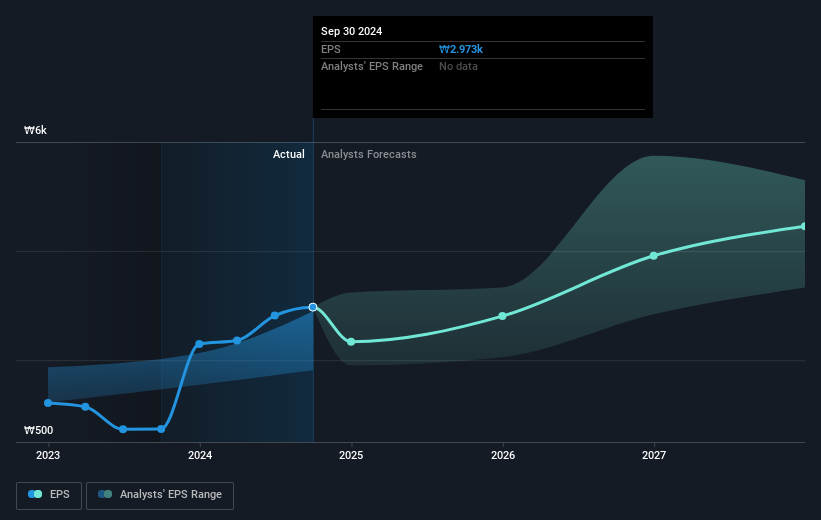- South Korea
- /
- Aerospace & Defense
- /
- KOSE:A047810
Korea Aerospace Industries' (KRX:047810) five-year earnings growth trails the 14% YoY shareholder returns

Korea Aerospace Industries, Ltd. (KRX:047810) shareholders might be concerned after seeing the share price drop 17% in the last quarter. Looking further back, the stock has generated good profits over five years. Its return of 91% has certainly bested the market return!
Since the stock has added ₩302b to its market cap in the past week alone, let's see if underlying performance has been driving long-term returns.
Check out our latest analysis for Korea Aerospace Industries
There is no denying that markets are sometimes efficient, but prices do not always reflect underlying business performance. One imperfect but simple way to consider how the market perception of a company has shifted is to compare the change in the earnings per share (EPS) with the share price movement.
During five years of share price growth, Korea Aerospace Industries achieved compound earnings per share (EPS) growth of 5.4% per year. This EPS growth is slower than the share price growth of 14% per year, over the same period. So it's fair to assume the market has a higher opinion of the business than it did five years ago. And that's hardly shocking given the track record of growth.
The image below shows how EPS has tracked over time (if you click on the image you can see greater detail).

We know that Korea Aerospace Industries has improved its bottom line over the last three years, but what does the future have in store? If you are thinking of buying or selling Korea Aerospace Industries stock, you should check out this FREE detailed report on its balance sheet.
What About Dividends?
When looking at investment returns, it is important to consider the difference between total shareholder return (TSR) and share price return. Whereas the share price return only reflects the change in the share price, the TSR includes the value of dividends (assuming they were reinvested) and the benefit of any discounted capital raising or spin-off. It's fair to say that the TSR gives a more complete picture for stocks that pay a dividend. We note that for Korea Aerospace Industries the TSR over the last 5 years was 96%, which is better than the share price return mentioned above. And there's no prize for guessing that the dividend payments largely explain the divergence!
A Different Perspective
It's nice to see that Korea Aerospace Industries shareholders have received a total shareholder return of 6.8% over the last year. And that does include the dividend. Having said that, the five-year TSR of 14% a year, is even better. Potential buyers might understandably feel they've missed the opportunity, but it's always possible business is still firing on all cylinders. I find it very interesting to look at share price over the long term as a proxy for business performance. But to truly gain insight, we need to consider other information, too. Take risks, for example - Korea Aerospace Industries has 1 warning sign we think you should be aware of.
We will like Korea Aerospace Industries better if we see some big insider buys. While we wait, check out this free list of undervalued stocks (mostly small caps) with considerable, recent, insider buying.
Please note, the market returns quoted in this article reflect the market weighted average returns of stocks that currently trade on South Korean exchanges.
Valuation is complex, but we're here to simplify it.
Discover if Korea Aerospace Industries might be undervalued or overvalued with our detailed analysis, featuring fair value estimates, potential risks, dividends, insider trades, and its financial condition.
Access Free AnalysisHave feedback on this article? Concerned about the content? Get in touch with us directly. Alternatively, email editorial-team (at) simplywallst.com.
This article by Simply Wall St is general in nature. We provide commentary based on historical data and analyst forecasts only using an unbiased methodology and our articles are not intended to be financial advice. It does not constitute a recommendation to buy or sell any stock, and does not take account of your objectives, or your financial situation. We aim to bring you long-term focused analysis driven by fundamental data. Note that our analysis may not factor in the latest price-sensitive company announcements or qualitative material. Simply Wall St has no position in any stocks mentioned.
About KOSE:A047810
Korea Aerospace Industries
Manufactures and sells fixed and rotary wing aircrafts, and airframe products in South Korea.
Reasonable growth potential with adequate balance sheet.
Similar Companies
Market Insights
Community Narratives



